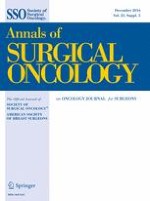Erschienen in:

12.09.2016 | Breast Oncology
Increasing Appropriate BRCA1/2 Mutation Testing: The Role of Family History Documentation and Genetic Counseling in a Multidisciplinary Clinic
verfasst von:
Amar U. Kishan, MD, Caitlin L. Gomez, MD, Nicole A. Dawson, MD, Robyn Dvorak, MD, Nova M. Foster, MD, Anne Hoyt, MD, Sara A. Hurvitz, MD, Amy Kusske, MD, Erica L. Silver, MD, Charles Tseng, MD, Susan A. McCloskey, MD
Erschienen in:
Annals of Surgical Oncology
|
Sonderheft 5/2016
Einloggen, um Zugang zu erhalten
Abstract
Background
Findings show that 5–10 % of women with a diagnosis of breast cancer (BCa) have actionable genetic mutations. The National Comprehensive Cancer Network guidelines for testing to detect BRCA1/2 mutations include personal history (PH) variables such as age of 45 years or younger and a family history (FH) variables. Rates of FH documentation and overall rates of appropriate referral for genetic testing are low, ranging from about 30 to 60 %. The authors hypothesized that an upfront FH documentation and inclusion of a genetics counselor in a multidisciplinary clinic (MDC) setting would increase rates of appropriate referral for genetic testing.
Methods
The study enrolled 609 consecutive women with non-metastatic BCa seen in consultation between June 2012 and December 2015 at a multidisciplinary clinic. Rates of FH documentation and referral for genetic testing to detect BRCA1/2 mutations were assessed before and after inclusion of a genetic counselor in the MDC.
Results
The rates of FH documentation and appropriate referral were 100 and 89 %, respectively. Half (50 %) of the patients had only FH-based indications for testing. All the patients with PH-based indications were referred. The inclusion of a genetic counselor significantly increased appropriate referral rates among those with only FH-based indications (62 vs. 92 %) and overall (80 vs. 96 %) (p < 0.0001 for both). Among the 12 % of the patients with actionable mutations, 60 % were 45 years of age or younger, whereas 30 % had only FH-based testing indications.
Conclusions
This report shows substantially higher FH documentation and appropriate genetic testing rates than prior reports. Many patients with indications for genetic testing may have only FH-based indications for testing, and this subset may account for the sizable proportion of patients with newly diagnosed BCa who have actionable mutations.











